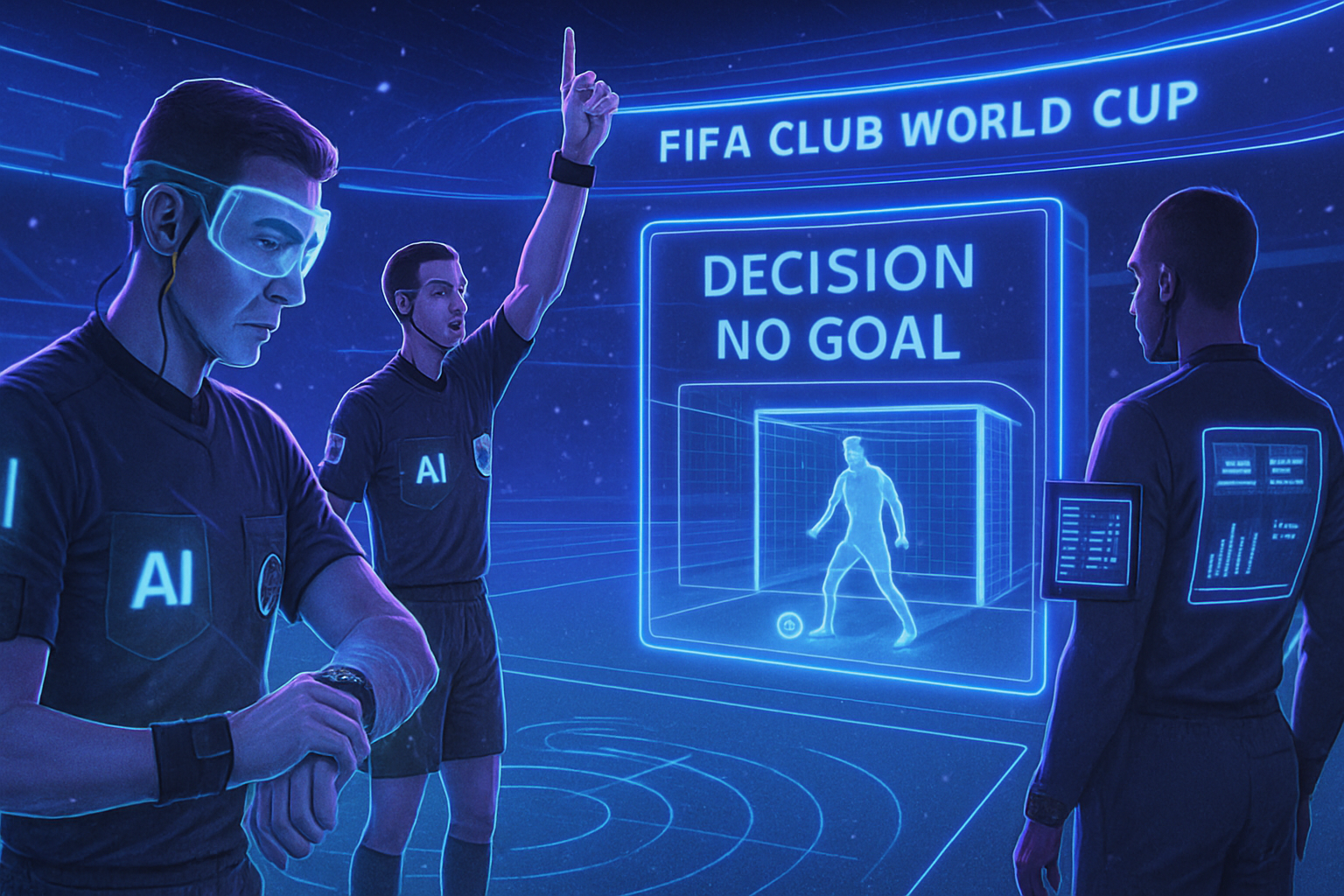Artificial intelligence is becoming established in officiating during the FIFA Club World Cup. This technological shift raises intense debates about its influence on the integrity of the game. Sophisticated algorithms monitor every movement, promising unmatched precision in areas where human error has historically prevailed.
This advancement raises significant questions about the future of football. Virtual referees could replace human decisions, radically transforming the course of matches. The use of a sensor in the ball and a multitude of cameras paves the way for instant reviews of disputed decisions.
The myth of zero defects becomes tangible, but at what cost to the very essence of the sport? The quest for infallible justice triggers profound repercussions and redefines the relationship between technology and tradition.
Technology and Officiating at the Club World Cup
The FIFA introduces a new era in officiating with the integration of artificial intelligence during the Club World Cup that begins on June 14, 2025. This innovative system relies on multiple cameras and a sensor inside the ball, aiming to revolutionize game tracking.
Monitoring Systems and Alerts
The automatic offside detection system promises to issue real-time alerts to every member of the officiating team. It continuously tracks the position of each player and the ball, allowing for quick and accurate decision-making. This change adds to a broader trend of automation of decisions in sports.
A Technological Revolution
This mechanism builds on the previous use of semi-automated technologies, such as those tested during the World Cup in Qatar. The intervention of a sensor in the ball had already allowed data to be sent nearly 500 times per second. However, with artificial intelligence, a new level is reached in data analysis and player tracking.
Reduction of Human Role
By integrating AI, the FIFA is making a significant transfer of power from the officiating team to algorithms capable of processing information instantly. The situation becomes complicated for referees, traditionally seen as the decisive factor on the field, in the face of this technological advancement.
Caution, this automation does not eradicate human intervention. The FIFA statement highlights that before announcing a decision, video assistant refereeing must always validate the information provided, thus preserving a human element in the decision-making process.
Economic and Commercial Consequences
This evolution is also indicative of a paradigm shift within football. AI-assisted officiating is not just about seeking perfection, but aligns with FIFA’s commercial ambitions. The sport, now a consumer product, seeks to maximize spectator experience while minimizing human errors.
The Club World Cup represents not just a sports event but a platform to test and deploy innovative technologies that redefine the traditional semblance of the game. The examination of electronic officiating could mark a significant turning point in football history.
Technology and the Myths of Zero Defects
This radical change positions itself as a quest for the myth of zero defects in officiating. Such perfection is ambitious but raises questions about the essence of sport and the place given to human error. After all, the human element has always been at the heart of the game.
The public is closely watching these innovations, weighing the ramifications of such reliance on algorithmic systems. The impact of artificial intelligence on officiating raises the debate about sports integrity in the face of technological advancement.
More information on the regulation of AI and its social implications can be found at this link: AI and Regulation. Another aspect to consider is the global impact of AI, especially regarding international competition, available here: AI and International Politics.
Questions and answers on the impact of artificial intelligence on officiating at the FIFA Club World Cup
How will artificial intelligence change officiating during the Club World Cup?
Artificial intelligence will enable more accurate detection of fouls, particularly offsides, through real-time tracking of player and ball positions. This will assist referees in making more reliable decisions.
What is the role of cameras in the AI-assisted officiating system?
The cameras will capture the movements of players and the ball, allowing the system to issue automatic alerts to referees in the event of blatant offside situations.
Will VAR still be used with this new artificial intelligence system?
Yes, VAR will continue to play its role, as it will validate the information provided by the artificial intelligence system before a decision is made by the referee.
What benefits does FIFA hope to gain from using artificial intelligence in officiating?
FIFA seeks to improve the accuracy of officiating decisions, reduce controversies, and enhance the credibility of football by offering more objective officiating that is less prone to human error.
Are there risks associated with the use of artificial intelligence in officiating?
While AI may improve accuracy, there are concerns about excessive reliance on technology and the risk of neglecting human judgment in complex situations.
When will the artificial intelligence system be fully operational during the competition?
The system will be implemented from the start of the Club World Cup, which begins on June 14, 2025, and will be used throughout the competition.
How has the offside detection technology evolved since its use in previous tournaments?
The technology has progressed with the addition of artificial intelligence and algorithms, now allowing for real-time tracking and accurate detection, marking a significant advancement over previously used systems.
Will players and coaches be informed about the use of this technology during matches?
Yes, communication protocols will be in place to ensure that players and coaches are informed about the use of this system, ensuring transparency and understanding of officiating decisions.
What is the football experts’ reaction to the introduction of AI in officiating?
Experts’ opinions are mixed; some see the advantages of more precise decision-making, while others warn against a loss of humanity in the decision-making process.






